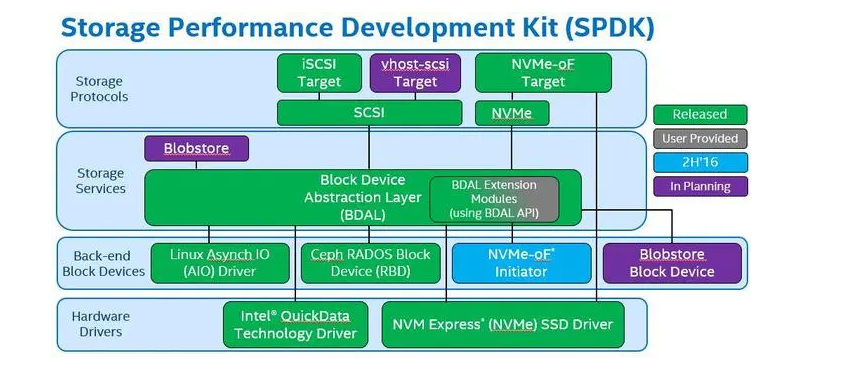以下是10个 OvS(Open vSwitch)的入门开发的代码案例:
- 创建一个简单的OvS交换机实例。
#include <stdio.h>
#include <stdlib.h>
#include <openvswitch/vconn.h>
#include <openvswitch/ofpbuf.h>
int main() {
struct vconn *vconn;
const char *target = "tcp:127.0.0.1:6653";
// 连接到OvS交换机
vconn = vconn_open(target);
if (vconn == NULL) {
printf("连接失败\n");
return -1;
}
printf("成功连接到OvS交换机\n");
// 关闭连接
vconn_close(vconn);
return 0;
}
- 获取OvS交换机的端口信息。
#include <stdio.h>
#include <stdlib.h>
#include <openvswitch/vswitch-idl.h>
int main() {
struct ovsdb_idl *idl;
// 初始化OVS数据库IDL对象
idl = ovsdb_idl_create();
// 连接到本地OVS数据库
if (ovsdb_idl_connect(idl, "unix:/var/run/openvswitch/db.sock") != 0) {
printf("连接到OVS数据库失败\n");
return -1;
}
// 获取端口信息
const struct ovsrec_interface_table *iface_table = &idl->tables->interface;
const struct ovsrec_interface *iface;
// 遍历所有接口
OVSDATABASE_FOR_EACH(iface, iface_table) {
printf("接口名称:%s\n", iface->name);
}
// 释放资源
ovsdb_idl_destroy(idl);
return 0;
}
- 创建一个OvS交换机端口。
#include <stdio.h>
#include <stdlib.h>
#include <openvswitch/vswitch-idl.h>
int main() {
struct ovsdb_idl *idl;
// 初始化OVS数据库IDL对象
idl = ovsdb_idl_create();
// 连接到本地OVS数据库
if (ovsdb_idl_connect(idl, "unix:/var/run/openvswitch/db.sock") != 0) {
printf("连接到OVS数据库失败\n");
return -1;
}
// 创建一个端口
const char *port_name = "eth0";
struct ovsrec_interface interface_row;
memset(&interface_row, 0, sizeof(interface_row));
ovsrec_interface_init(&interface_row, idl);
STRDUP(interface_row.name, port_name);
interface_row.type = OVSREC_INTERFACE_TYPE_ETHERNET;
ovsdb_idl_add_row(idl, &interface_row._uuid);
printf("成功创建端口:%s\n", port_name);
// 提交更改到OVS数据库
if (ovsdb_idl_txn_commit_block(idl) != 0) {
printf("提交更改失败\n");
return -1;
}
printf("成功提交更改\n");
// 释放资源
ovsdb_idl_destroy(idl);
return 0;
}
- 添加流表项到OvS交换机。
#include <stdio.h>
#include <stdlib.h>
#include <openvswitch/ofp-parse.h>
#include <openvswitch/ofpbuf.h>
#include <openvswitch/vconn.h>
int main() {
struct vconn *vconn;
const char *target = "tcp:127.0.0.1:6653";
// 连接到OvS交换机
vconn = vconn_open(target);
if (vconn == NULL) {
printf("连接失败\n");
return -1;
}
printf("成功连接到OvS交换机\n");
// 创建流表项
struct ofpbuf *ofpacts = ofpbuf_new(OFPP_MAX);
ofpact_put_OUTPUT(ofpacts, 1);
// 添加流表项到OVS交换机
struct ofputil_flow_mod fm;
memset(&fm, 0, sizeof(fm));
fm.table_id = OFPTT_ALL;
fm.command = OFPFC_ADD;
fm.buffer_id = OVS_BUFFER_ID_INVALID;
fm.priority = 1000;
ofpact_put_GOTO_TABLE(ofpacts, 1);
fm.ofpat_args.actions_len = ofpacts->size;
fm.ofpat_args.actions_buf = ofpacts->data;
vconn_send(vconn, &fm, sizeof(fm), ofpacts);
printf("成功添加流表项\n");
// 关闭连接
vconn_close(vconn);
return 0;
}
- 设置OvS交换机端口的MAC地址。
#include <stdio.h>
#include <stdlib.h>
#include <openvswitch/vswitch-idl.h>
int main() {
struct ovsdb_idl *idl;
// 初始化OVS数据库IDL对象
idl = ovsdb_idl_create();
// 连接到本地OVS数据库
if (ovsdb_idl_connect(idl, "unix:/var/run/openvswitch/db.sock") != 0) {
printf("连接到OVS数据库失败\n");
return -1;
}
// 设置端口的MAC地址
const char *port_name = "eth0";
const char *mac_address = "00:11:22:33:44:55";
struct ovsrec_interface *iface = ovsrec_interface_first(idl);
while (iface != NULL) {
if (strcmp(iface->name, port_name) == 0) {
STRDUP(iface->mac_in_use, mac_address);
break;
}
iface = ovsrec_interface_next(iface);
}
if (iface == NULL) {
printf("找不到端口:%s\n", port_name);
return -1;
}
printf("成功设置端口的MAC地址\n");
// 提交更改到OVS数据库
if (ovsdb_idl_txn_commit_block(idl) != 0) {
printf("提交更改失败\n");
return -1;
}
printf("成功提交更改\n");
// 释放资源
ovsdb_idl_destroy(idl);
return 0;
}
- 获取OvS交换机流表项。
#include <stdio.h>
#include <stdlib.h>
#include <openvswitch/ofp-parse.h>
#include <openvswitch/ofpbuf.h>
#include <openvswitch/vconn.h>
int main() {
struct vconn *vconn;
const char *target = "tcp:127.0.0.1:6653";
// 连接到OvS交换机
vconn = vconn_open(target);
if (vconn == NULL) {
printf("连接失败\n");
return -1;
}
printf("成功连接到OvS交换机\n");
// 获取流表项
struct ofputil_flow_stats_request req;
memset(&req, 0, sizeof(req));
req.table_id = OFPTT_ALL;
struct ofpbuf *request = ofputil_encode_flow_stats_request(&req);
vconn_send_block(vconn, request->data, request->size);
uint8_t buffer[4096];
int n_bytes = vconn_recv(vconn, buffer, sizeof(buffer));
if (n_bytes > 0) {
struct ofpbuf *reply = ofpbuf_new(4096);
ofpbuf_use_const(reply, buffer, n_bytes);
struct ofputil_flow_stats stats;
memset(&stats, 0, sizeof(stats));
while (!ofputil_pull_flow_stats(reply->data,
reply->size,
&stats)) {
printf("流表项优先级:%d\n", stats.priority);
printf("匹配字段数量:%d\n", stats.match.n_fields);
/* 可以在这里继续处理其他流表项信息 */
memset(&stats, 0, sizeof(stats));
}
ofpbuf_delete(reply);
}
// 关闭连接
vconn_close(vconn);
return 0;
}
- 修改OvS交换机端口的状态。
#include <stdio.h>
#include <stdlib.h>
#include <openvswitch/vswitch-idl.h>
int main() {
struct ovsdb_idl *idl;
// 初始化OVS数据库IDL对象
idl = ovsdb_idl_create();
// 连接到本地OVS数据库
if (ovsdb_idl_connect(idl, "unix:/var/run/openvswitch/db.sock") != 0) {
printf("连接到OVS数据库失败\n");
return -1;
}
// 修改端口状态为DOWN
const char *port_name = "eth0";
struct ovsrec_interface *iface = ovsrec_interface_first(idl);
while (iface != NULL) {
if (strcmp(iface->name, port_name) == 0) {
iface->admin_state = OVSREC_INTERFACE_ADMIN_STATE_DOWN;
break;
}
iface = ovsrec_interface_next(iface);
}
if (iface == NULL) {
printf("找不到端口:%s\n", port_name);
return -1;
}
printf("成功修改端口状态为DOWN\n");
// 提交更改到OVS数据库
if (ovsdb_idl_txn_commit_block(idl) != 0) {
printf("提交更改失败\n");
return -1;
}
printf("成功提交更改\n");
// 释放资源
ovsdb_idl_destroy(idl);
return 0;
}
- 删除OvS交换机的流表项。
#include <stdio.h>
#include <stdlib.h>
#include <openvswitch/ofp-parse.h>
#include <openvswitch/ofpbuf.h>
#include <openvswitch/vconn.h>
int main() {
struct vconn *vconn;
const char *target = "tcp:127.0.0.1:6653";
// 连接到OvS交换机
vconn = vconn_open(target);
if (vconn == NULL) {
printf("连接失败\n");
return -1;
}
printf("成功连接到OvS交换机\n");
// 删除流表项
struct ofputil_flow_mod fm;
memset(&fm, 0, sizeof(fm));
fm.table_id = OFPTT_ALL;
fm.command = OFPFC_DELETE;
vconn_send(vconn, &fm, sizeof(fm), NULL);
printf("成功删除流表项\n");
// 关闭连接
vconn_close(vconn);
return 0;
}
- 获取OvS交换机的统计信息。
#include <stdio.h>
#include <stdlib.h>
#include <openvswitch/ofp-parse.h>
#include <openvswitch/ofpbuf.h>
#include <openvswitch/vconn.h>
int main() {
struct vconn *vconn;
const char *target = "tcp:127.0.0.1:6653";
// 连接到OvS交换机
vconn = vconn_open(target);
if (vconn == NULL) {
printf("连接失败\n");
return -1;
}
printf("成功连接到OvS交换机\n");
// 请求获取统计信息
struct ofputil_port_stats_request req;
memset(&req, 0, sizeof(req));
req.port_no = OFPP_ANY;
struct ofpbuf *request = ofputil_encode_port_stats_request(&req);
vconn_send_block(vconn, request->data, request->size);
uint8_t buffer[4096];
int n_bytes = vconn_recv(vconn, buffer, sizeof(buffer));
if (n_bytes > 0) {
struct ofpbuf *reply = ofpbuf_new(4096);
ofpbuf_use_const(reply, buffer, n_bytes);
struct ofputil_port_stats stats;
memset(&stats, 0, sizeof(stats));
while (!ofputil_pull_port_stats(reply->data,
reply->size,
&stats)) {
printf("端口号:%d\n", stats.port_no);
printf("收到的数据包数量:%llu\n", stats.rx_packets);
/* 可以在这里继续处理其他统计信息 */
memset(&stats, 0, sizeof(stats));
}
ofpbuf_delete(reply);
}
// 关闭连接
vconn_close(vconn);
return 0;
}
- 设置OvS交换机端口的速率限制。
#include <stdio.h>
#include <stdlib.h>
#include <openvswitch/vswitch-idl.h>
int main() {
struct ovsdb_idl *idl;
// 初始化OVS数据库IDL对象
idl = ovsdb_idl_create();
// 连接到本地OVS数据库
if (ovsdb_idl_connect(idl, "unix:/var/run/openvswitch/db.sock") != 0) {
printf("连接到OVS数据库失败\n");
return -1;
}
// 设置端口的速率限制(带宽)
const char *port_name = "eth0";
int64_t rate_limit = 10000000; // 10Mbps
struct ovsrec_interface *iface = ovsrec_interface_first(idl);
while (iface != NULL) {
if (strcmp(iface->name, port_name) == 0) {
iface->ingress_policing_rate = rate_limit;
break;
}
iface = ovsrec_interface_next(iface);
}
if (iface == NULL) {
printf("找不到端口:%s\n", port_name);
return -1;
}
printf("成功设置端口的速率限制\n");
// 提交更改到OVS数据库
if (ovsdb_idl_txn_commit_block(idl) != 0) {
printf("提交更改失败\n");
return -1;
}
printf("成功提交更改\n");
// 释放资源
ovsdb_idl_destroy(idl);
return 0;
}
以上是10个OvS入门开发的代码案例,希望对您有帮助!
内容由零声教学AI助手提供,问题来源于学员提问





















